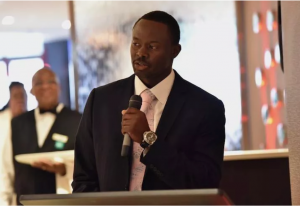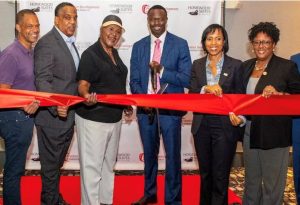Evens Charles has grown his D.C.-based real estate firm to more than $200M in assets over the last two decades, and last month it was awarded one of the biggest projects in the nation’s capital.
The CEO of Frontier Development & Hospitality, Charles studied and played football at Temple University before founding the company in 1998. Frontier began as a residential development and investment company before expanding into hospitality in 2009.
Frontier has developed or acquired at least nine hotels in D.C., Maryland, Virginia, Philadelphia, Atlanta, Nashville and Columbus, Ohio. It was ranked No. 63 on Black Enterprises’ 2019 list of the 100 largest Black-owned businesses in the U.S., with $51M in revenue.
The company’s hotels, like many in the country, were hit hard by the coronavirus pandemic last year. But Frontier’s properties have recovered with rising occupancy throughout this year, and last month the company received a major win to propel it to the next chapter of its growth.
On Nov. 3, D.C. Mayor Muriel Bowser selected a Frontier-led development team to build a 1.2M SF mixed-use project on a city-owned site near RFK Stadium in the Hill East neighborhood. The $500M-plus project is planned to have more than 1,200 multifamily units, a hotel and retail.
The following has been lightly edited for style and clarity.

Courtesy of Evens Charles
Frontier Development & Hospitality CEO Evens Charles
Bisnow: Tell us about your leadership philosophy and what experiences, words of advice or mentors shaped it along the way.
Charles: My leadership philosophy is one of being an eternal optimist. Failure is not an option, and there is always an expectation to overcome any circumstance. Growing up in humble beginnings — in a single-parent household within an environment plagued with adversity — helped develop an attitude of resiliency and perseverance. Also, growing up as an athlete, my coaches were my father figures and my inspiration as I was taught to be mentally tough and develop a winning attitude. You have to first conceive it, then believe it before you achieve it. Expect to win and even when you do not, learn from the loss and believe that you will eventually prevail.
Bisnow: How has the role of CEO/business leader changed over time — especially when considering the early days of your career to now?
Charles: Technology has changed the way we do business today and has changed how a CEO operates. Accessibility to products and services has changed and businesses are more productive today through technology. The customer’s expectations have also evolved, and the digital transformation is in full effect. In an interview with Forbes, Jeff Bezos once said, “I very rarely get pulled into the today … I get to work two or three years into the future, and most of my leadership team has the same setup.” I believe CEOs have to go to work in the future and be ahead of the curve.
Bisnow: What will the role of CEO look like in 10 years?
Charles: The future will consist of disruption that CEOs will have to adapt to that can come from technology, competitors delivering products and services in new innovative ways, and climate change. The ability to transact, employ, produce and manufacture from anywhere in the world will continue to evolve, therefore CEOs will have to continue to embrace and adapt in order to stay competitive. CEOs must adopt the philosophy that disruption affords an unparalleled opportunity for transformation and reinvention.
CEOs must also be prepared to evolve into an age where they are not only leading their businesses but also leading on societal issues; using their voice to advocate for policies on critical issues such as health, safety and education that benefit all stakeholders, employees and customers.

Courtesy of Evens Charles
Frontier Development’s Evens Charles, flanked by business partners and local officials, cutting the ribbon on a Homewood Suites hotel in Maryland.
Bisnow: Was leading a company always a goal for you? If so, why?
Charles: It was not always a goal for me, as I evolved into it unplanned. As a corporate employee, I just started investing in small real estate on the side seeking to create residual income. As time went on, I realized I wanted to be a full-time entrepreneur, transition from small investor to a business, and then leading a company to become a reality.
Bisnow: What has been your biggest mistake as a leader?
Charles: Losing focus on the value of time and sometimes allowing the pride of being correct to drag me into disputes that I end up regretting. Sometimes the size of the check to prevent something small from escalating (even if unjust), is worth more than the time of going back and forth disputing.
Bisnow: Has your thinking changed about the workplace between 2019 and today? How? What will your office strategy be moving forward?
Charles: Remote work has become the norm, which has broadened our outreach for talent beyond the local market. I would not have been as willing to do as much remote work if we were not forced into it over the last year. This is another example of adjusting to a major disruption and once again, we have to look into the future of our businesses and be ready to pivot quickly as the world changes.
Bisnow: There is a massive conversation underway regarding advancing more people of color and women into the C-suite. What are you doing to address those voices and that movement within your own organization?
Charles: This is so much more than a movement to us at Frontier; this issue is in our DNA. I personally represent this movement as a C-suite person of color always seeking ways to develop and cultivate the next generation of women and minority executives. I mentor, speak throughout underserved communities, HBCUs and I target this next generation via an endowed scholarship in my name to Temple University. We hire, support and promote the next generation of women and minority executives within the companies we do business with.
We recently assembled a 100% African American development team that pursued and was recently awarded a public-private partnership deal with the District of Columbia’s Office of the Deputy Mayor for Planning and Economic Development. The project is 1.2M SF of waterfront development within the Hill East neighborhood, where we will deliver 1,100 apartments (66% affordable), a 150-room Marriott hotel, 126 for-sale units (condos and townhouses), 100 co-living units, 65K SF of retail and a central neighborhood park. This Ward 7-based project is over half a billion dollars, which empowers our 100% minority team to advance other women and minority executives, as well as minority-led, certified business enterprise and women-led D.C.-based businesses.
Courtesy of Evens Charles
Frontier Development & Hospitality CEO Evens Charles (center) celebrating the groundbreaking of a project in Maryland.
Bisnow: What do you think about the recent focus on sustainability and climate change? Is it overblown? Insufficient? Is your company tackling climate change in any way or taking it under consideration in your planning?
Charles: The focus on sustainability and climate change should be taken very seriously as the impact on our industry could be drastic over time. Infrastructure and buildings will be susceptible to future risk. Climate risks including sea level changes, varying weather patterns, drought and heat stress can damage properties over time, leading to higher maintenance, operating costs and potentially much higher insurance costs. As a father, and in the interest of leaving a world in a better place, we look to contribute to climate change mitigation by building green where we can and developing LEED-certified buildings.
Bisnow: What is something CRE gets wrong in your eyes?
Charles: CRE tends to flock to what’s hot at the moment and sometimes with an overfocus until a bubble occurs. With the cyclical nature of our business, we tend to forget this when investing in a certain hot market or a certain hot asset class. We will continue developing and investing in what’s hot until we fall off the cliff and the market speaks back to us by saying “enough.” There are opportunities in many markets across all asset classes, but we should be cautious when everyone is looking to invest in the same market with a similar investment thesis. Maybe we avoid the fall or the cliff we fall off will not be as steep if we learn to pivot before what’s hot turns very cold overnight.
Bisnow: What asset class or location will perform best over the next five years? Why?
Charles: We believe in investing in what is not currently in favor as you create your profits on how you buy. As a result, we believe that recovering from Covid-19, hospitality is one of the least desirable asset classes today that we believe will come roaring back in the next few years.
Bisnow: What book, article or TedTalk meant the most to you? Why?
Charles: The early books I read that transitioned my frame of mind from employee to employer/entrepreneur was Think and Grow Rich as well as the Rich Dad Poor Dad series. I remember the lightbulb moment after reading these books that completely changed the way I thought about entrepreneurship and helped shape the journey that I am on today.
Bisnow: What is your all-time favorite TV show? Why?
Charles: Not a particular show, but the Biography channel or other channels that produce documentaries on great leaders are my favorite. Everyone has a story, and I love learning about the evolution of phenomenal people. I find these biographical documentaries extremely inspirational, motivating and entertaining.
Bisnow: How do you spend your Saturdays?
Charles: Spending time with family, prayer/meditation, reading and working out.
Contact Jon Banister at jon.banister@bisnow.com

